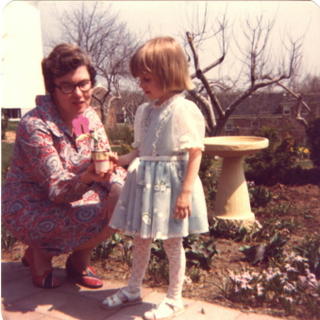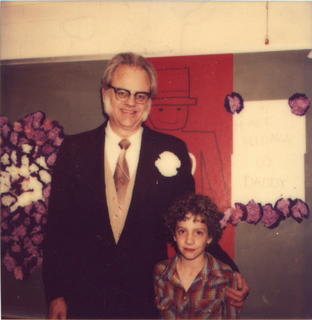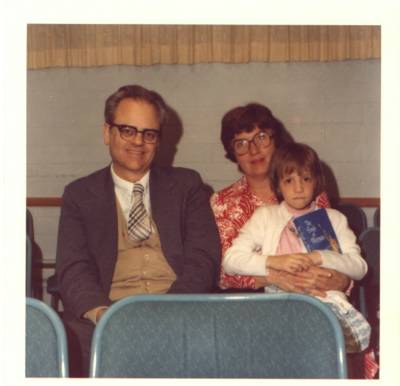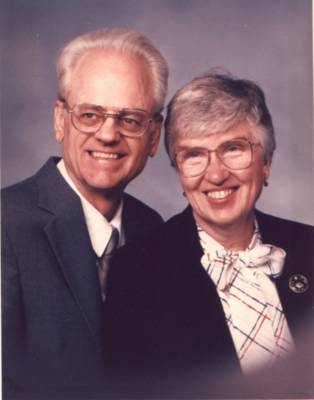I've written some of this on the Introduction page so bits may be repetitive.
My parents are, on paper at least, opposites. My mother is an artist with a B.A. in Art from Brigham Young University and a M.A. in Printmaking from SUNY Albany. She taught for several years
 before her first child was born. Like everyone in our family, she reads a lot, especially mysteries and currently Forester's Horatio Horn- blower series. She also reads history, and is something of an amateur historian on a few subjects; when I taught seminary for our church, she was my go-to person for The New Testament. My mother read to me up until I was in Junior High, and she probably would have kept going if I hadn't turned into a teenager and persisted in finishing the books we started. These days we share a love of books on tape. My mom used to invent stories as well, mostly about a troll named Milo. Her considerable artistic talents are more visual (she understands abstract art!), and in the last ten years that creative flair has expressed itself more and more in her flower garden(s).
before her first child was born. Like everyone in our family, she reads a lot, especially mysteries and currently Forester's Horatio Horn- blower series. She also reads history, and is something of an amateur historian on a few subjects; when I taught seminary for our church, she was my go-to person for The New Testament. My mother read to me up until I was in Junior High, and she probably would have kept going if I hadn't turned into a teenager and persisted in finishing the books we started. These days we share a love of books on tape. My mom used to invent stories as well, mostly about a troll named Milo. Her considerable artistic talents are more visual (she understands abstract art!), and in the last ten years that creative flair has expressed itself more and more in her flower garden(s). My father is a scientist with a Ph.D. in nuclear physics. He worked at G.E. Research & Development all his career and was part of the team that created the first industrial diamond. He claims not to understand Quantum Mechanics, which is kind of like Shakespeare disclaiming higher education (it may be true, but come on, it's Shakespeare). My clearest childhood memory of my father is of him
 paraphrasing science articles at the dinner table. Even now, he will pass on tidbits from Greene's Elegant Universe or articles he has read, and he helps me consider- ably with my sci-fi stories. Despite being the introvert in the relationship, my father has acted in a number of plays and once recitated Lewis Carroll's The Song of the White Knight with me playing the part of Alice. Nowadays, he plays the stock market, levels the lawn (and levels the lawn . . . and levels the lawn). He also has a penchant for history and when I taught seminary, he was my go-to person for Old Testament and Book of Mormon.
paraphrasing science articles at the dinner table. Even now, he will pass on tidbits from Greene's Elegant Universe or articles he has read, and he helps me consider- ably with my sci-fi stories. Despite being the introvert in the relationship, my father has acted in a number of plays and once recitated Lewis Carroll's The Song of the White Knight with me playing the part of Alice. Nowadays, he plays the stock market, levels the lawn (and levels the lawn . . . and levels the lawn). He also has a penchant for history and when I taught seminary, he was my go-to person for Old Testament and Book of Mormon. So, on paper, my parents would seem to be opposites, complementary opposites, but opposites nonetheless. Extrovert/Introvert. Science/Art. Language/Math. However, these are false dichotomies. My parents operate, as the saying goes, on the same wavelength. One component of that wavelength is their service in the Mormon Church (in which we were all reared). They work in the Boston Temple every week which, for people living in Maine, entails a fair amount of time and money, all volunteered. Another component, and the one that brings us back to popular culture, is their commonsense. They are commonsensical. Not given to sentimentality (although a romantic streak runs through the family) but people whose discernment of bull is so well-attuned, it's kind of a non-issue. There's not any cynicism involved. They just see the world as is and keep going. (Maybe it's a gardening thing.) Which isn't to say my parents, like all of us, don't have their pet peeves, their soap boxes and their sacred cows but they also, to a remarkable degree, try to look at themselves objectively. I'm not saying they always succeed. Does anyone? But the point is, they try.
What it boils down to is: they did not raise their children to be relativists. Life might all be some mind game, God might be a boiled egg and time might not exist, but if you're an artist and a scientist of my parents' school of thought, you start from the proposition that something is going on around you, you are inputting data. Sure, it could all be in your head, but that's a totally boring approach to life so why bother going there? Start with the proposition that some sort of reality does exist, that we are all experiencing some degree of synchronicity and then accept the hard work of trying to understand it (which hard work should not entail either angsty self-righteous intellectualism or undisciplined "oh nobody knows anything anyway" gloppiness) and well, life rapidly gets very fun.
Which is what my parents taught me and is what I'd like to thank them for here. Life is great! Life is fun! My parents are kind of like spiritual anti-Augustinians. The body is good! The physical world is a blessing! It's swell to be alive! Isn't it interesting? Isn't it grand? They are Mormons born and bred, and their particular attitude towards life is influenced by the progressive positivism implicit in Mormonism: that life matters, that it isn't just some way-station where we hang out and mope until God snatches us home; it isn't just an experiment where God prods us with a few trials and notes our responses and pats us on the head. Life is worth living for its own sake because only living life (for its own sake) can prepare you for the next stage. Life should fully engage us. God wants it to. You can't live in heaven if you don’t know how to live on earth. Come Judgment Day, God will hand out as much freedom and experience and love as we can handle. If we can't, if we settle for dry, stale ideologies, if we weigh ourselves down with distrust, anger, guilt and cynicism, that's the kind of heaven we'll settle for. So, in a way, the relativists are right, because the heaven you think is possible is the heaven you will get. The point of religion, Mormonism in particular, is to train us not to settle for less. And it starts with our immediate surroundings.

Baptism Day
Okay, morphed a bit there into my own opinion, but it all goes back to my parents. I grew up knowing that my parents had a multiplicity of interests that went beyond their family and for that matter, each other.
 Those interests often dovetail (like the lawn, the dirt, the vegetable garden, the flower garden and the fruit trees: ALL related) in their theological beliefs as well as the arts, but my parents were always individuals in my eyes, which, for a child, can be revelatory if a little frightening. These people, one learns fairly early, are not just here for my benefit. And too, I grew up seeing that, contrary to an attitude I've run into lately, religious observance does not limit a person to a white-room-with-white- curtains-and-white-floor mentality.
Those interests often dovetail (like the lawn, the dirt, the vegetable garden, the flower garden and the fruit trees: ALL related) in their theological beliefs as well as the arts, but my parents were always individuals in my eyes, which, for a child, can be revelatory if a little frightening. These people, one learns fairly early, are not just here for my benefit. And too, I grew up seeing that, contrary to an attitude I've run into lately, religious observance does not limit a person to a white-room-with-white- curtains-and-white-floor mentality. Now, my parents have never been into The Top 40. They don't particularly like action movies (Schwarzenegger variety). They detest commercials. They have never, to my knowledge, attended a rock concert. And we grew up without a TV (well, for most of the time). You couldn't have paid my mom to watch soaps. Which isn't to say we didn't go out to see movies (where my father, the most honest man alive, would let us sneak food into the theatre). Still I mostly grew up going to ballet and listening to opera and classical music and seeing Shakespeare. My parents truly enjoy doing all those things. But—here's where the commonsense comes into play—it was never "we're seeing this because of how important it is," it was "we're seeing this because we like to." They also like Agatha Christie (my mom), Alice in Wonderland (my dad), Peter, Paul & Mary, Garrison Keillor (before he got popular mostly), chocolate (my mom!), Tolkien, shaggy dog stories (my dad) and so on and so forth.
And the more I study popular culture and listen to academics talk about popular culture, the more I've realized that this is the missing component. Academics can read between the lines like nobody's business. They can analyze till the cows come home. But at some basic level, they don't understand why people really like what they like. So they make up reasons. If they like it themselves, they give themselves Freudian complexes or shake their heads at their own cupidity (I've been brainwashed by the corporate capitalistic conspiracy!). But it never seems to occur to them that it's fun! That's it's funny! You don't have to believe that watching action movies involves a deliberate suspension of belief to which all parties are privy (the secret compact theory of popular culture), you just have to believe that people like doing it.
So, Mom and Dad, thanks for teaching me that life is fun, that enjoying life is as much a part of religion as praying or reading the scriptures, that the world is a fantastic place that it never harms us to find out more about and especially for loving life and each other.
June 29, 2005.

